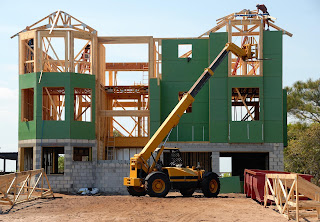The real estate market has been booming in the last couple of years and shows no signs of slowing down any time soon. For those looking to get in on the action without being tied down to one property, there are plenty of business opportunities that can grow your portfolio without straining your budget or requiring you to be tied down. Here are some of the best real estate business ideas out there today.
1) Fixer-Upper Flips
Do you love finding hidden gems and breathing new life into them? You could become a real estate agent specializing in fixer-upper flips! This involves working with sellers who are motivated to sell their properties fast, often at a discount. You’ll need to be comfortable dealing with repairs and renovations, as well as have a network of contractors you can rely on.
If you’re looking for a more hands-off approach, you could become a real estate investor. There are many ways to invest in real estate, from buying property outright to investing in a real estate investment trust (REIT). Commercial real estate is another option, though it typically requires more capital than residential investments.
2) Lease Options
A lease option is when a tenant leases a property with the option to purchase the property at a set price within a certain timeframe. This option is usually only available for a fee and gives the tenant time to save up for a down payment while also giving them first dibs on purchasing the home. If you're thinking about how to become a real estate agent, one way is by working with lease options! You'll need to get your real estate license and join a real estate agency, but once you do, you can start helping people find their perfect homes. On top of being able to provide valuable insight into what kind of place might work best for a given person's needs, you'll also be able to help them out financially as well. The fact that you're doing this for free makes it that much better!
3) Land Lording
If you're thinking about getting into the real estate business, but don't want to be a property manager, then land lording could be a great option for you. With land lording, you can simply purchase a property, and then rent it out to tenants. You'll be responsible for maintaining the property and collecting rent, but you won't have to deal with any of the day-to-day management tasks. Plus, you can use this passive income to help grow your portfolio. For example, if you purchased a home worth $200,000, and the average monthly rent is $1,000 per month ($12,000 per year), then your annual return on investment would be 12%. As long as you keep up with maintenance costs and find quality tenants to occupy the home (which is sometimes easier said than done), land lording can provide an excellent ROI.
4) Wholesaling Properties
5) House Hacking – Becoming a Landlord Without the Work!
If you’re looking for a creative way to get into the real estate game, house hacking just might be for you. The concept is simple: buy a property with multiple units and live in one while renting out the others. This way, you’re offsetting some (or all) of your living expenses by generating rental income. And, as the landlord, you get to call the shots! You can choose how much rent you want to charge based on market rates and set different rates for different unit sizes. Or, if this sounds like too much work, find an experienced manager who will take care of everything from finding tenants to fixing leaky faucets so that you can focus on running your business.
6) Purchasing Discounted Property
1. Look for foreclosures, bankruptcies, and short sales. 2.
Research the market and understand what sells and for how much. 3. Find a
motivated seller who is willing to negotiate on price. 4. Get a good deal on
financing so you don’t have to put too much money down. 5. Make sure the
property is in a good location that will appreciate in value. 6. Don’t
over-improve the property; stick to cosmetic upgrades that will add value
without breaking the bank. 7. Have a solid plan for how you will rent or sell
the property once it is fixed up so you can make a profit.
7) Rental Income Strategies
1. Purchase a fixer-upper and rent it out while you complete
renovations. This strategy can be a great way to bring in extra income, while
also increasing the value of your property.
2. Create a vacation rental in a popular tourist
destination. This can be a great way to earn income year-round, as people are
always looking for places to stay during their vacations.
3. Invest in a multifamily property and live in one unit
while renting out the others. This is a great way to get started in the real
estate investing world, as you’ll have tenants helping to pay down your
mortgage.
4. Purchase a property with the intention of flipping it for
a profit.
8) Single Family Rentals – Houses, Condos and Town homes
1. There’s always demand for rental properties, as people
are always moving for work, school or other reasons.
2. By investing in a rental property, you can get passive
income each month while the tenant covers most – if not all – of the mortgage
and expenses.
3. Plus, you can get tax breaks and depreciation write-offs
as a landlord.
4. And if you buy in an area with population growth, you can
expect your property value – and rental rates – to go up over time.
5. Just be sure to do your due diligence before buying any property, as there can be hidden costs and risks involved. Be aware that you may need to pay a larger down payment (in some cases 20% or more) and maintain good credit history. You may also have to cover utilities, taxes, insurance, upkeep and vacancy periods. 6. Finally, make sure you research your market well before purchasing any type of real estate investment - just because one person had success doesn't mean it will work for everyone else!
9) Apartment Complexes / Multifamily (5+ units)
There are many benefits to owning an apartment complex or
multifamily dwelling. For one, you’ll have many tenants which will help reduce
your overall risk. Additionally, these types of properties tend to appreciate
in value at a higher rate than single-family homes and also generate more cash
flow. If you’re looking for a solid real estate investment, consider investing
in an apartment complex or multifamily dwelling. These types of properties
typically appreciate in value faster than single-family homes and provide
plenty of rental income opportunities.
However, this type of property requires a larger upfront
capital outlay, so make sure you can afford the initial cost before purchasing
any property.
Here are the tips for Investing in Real Estate!







